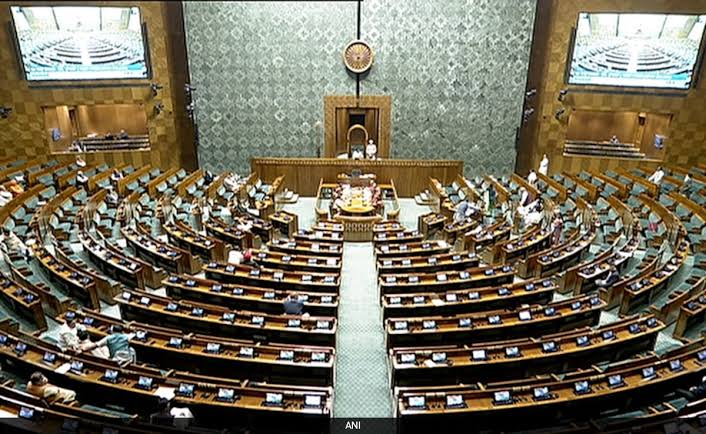New Delhi, April 2, 2025 – The BJP-led NDA government is set to introduce the Waqf (Amendment) Bill, 2024, in the Lok Sabha on Wednesday, setting the stage for a heated debate with opposition parties. The Bill, which seeks to amend the Waqf Act, 1995, has drawn strong reactions from various political and religious groups, particularly over provisions related to Waqf property management and dispute resolution.
Opposition Mounts Resistance, NDA Secures Support
Both the BJP and the Congress have issued a whip to their MPs to ensure maximum attendance in the Lok Sabha. The Bill was cleared for discussion by the Business Advisory Committee (BAC), chaired by Speaker Om Birla, which allotted eight hours for deliberation.
However, opposition parties staged a walkout from the BAC meeting, protesting the government’s refusal to discuss the Manipur violence and allegations of duplicate voter IDs. Despite their objections, the government appears confident of passing the Bill, with NDA allies like the JD(U), TDP, Shiv Sena, and LJP lending their support.
In the Lok Sabha (543 seats), the NDA holds a comfortable position with:
BJP: 240 MPs
TDP: 16 MPs
JD(U): 12 MPs
Shiv Sena: 7 MPs
LJP: 5 MPs
RLD: 2 MPs
Apna Dal: 1 MP
With 272 needed for a majority, the Bill is expected to pass smoothly in the Lower House.
In the Rajya Sabha (236 seats, 119 needed for a majority), the NDA has 123 MPs, including 98 from the BJP, making its passage likely there as well.
Key Amendments and Controversial Provisions
The Waqf (Amendment) Bill, 2024, proposes several significant changes to how Waqf properties are managed and regulated:
1. End of ‘Waqf by User’ Clause:
Under the 1995 Waqf Act, land used for religious or charitable purposes over a long period could automatically become Waqf property under the “Waqf by user” rule.
The new Bill removes this provision, requiring formal Waqf deeds for any property to be classified as Waqf land.
This is particularly contentious since 4.2 lakh out of India’s 8.72 lakh surveyed Waqf properties fall under this category.
The Joint Parliamentary Committee (JPC) has recommended that the change apply only to future cases, not retroactively.
2. Restrictions on Who Can Create Waqf:
The original 1954 and 1995 Waqf Acts allowed only Muslims to create Waqf properties.
A 2013 amendment changed this, allowing any person to dedicate land as Waqf.
The new Bill reverses this and mandates that only practicing Muslims (for at least five years) can create Waqf properties.
3. Changes in Waqf Tribunal Decisions:
Under the 1995 law, decisions made by Waqf Tribunals were final.
The amendment allows appeals to the High Court within 90 days, expanding legal recourse for disputes.
4. Authority Over Government Land:
The Waqf Boards of various states have declared nearly 6,000 government properties as Waqf land, leading to legal disputes.
The Bill empowers district collectors to decide if government land can be classified as Waqf.
The JPC, however, has recommended assigning this power to a higher-ranking officer than the District Collector.
5. Online Transparency and Documentation:
The 8.72 lakh Waqf properties across India will need to upload all details online within six months of the law’s enactment.
6. Inclusion of Non-Muslims in Waqf Bodies:
The Central Waqf Council and State Waqf Boards—which manage Waqf properties—will now be open to non-Muslim members.
The amendment also allows separate Waqf Boards for the Bohra and Aghakhani sects of Shia Muslims, whereas previously, only Shia and Sunni Waqf Boards existed.
Political and Religious Reactions
The Bill has sparked backlash from opposition parties and Muslim organizations.
Bihar CM Nitish Kumar (JD-U) and TDP leader Chandrababu Naidu—both of whom rely on Muslim voter support—have expressed concerns. Sources indicate that Nitish Kumar had communicated these to PM Narendra Modi, and the final draft may include some accommodations.
The All India Muslim Personal Law Board (AIMPLB) has been holding protests across the country, arguing that the Bill undermines Waqf rights and Muslim religious institutions.
The Archaeological Survey of India (ASI) claims that 280 protected monuments have been declared Waqf properties under the existing law, a situation the new amendment seeks to correct.
Why This Matters Now
The timing of the Waqf (Amendment) Bill, 2024, is significant, as it comes ahead of the Bihar state elections and the 2026 general elections. By pushing this Bill, the BJP aims to consolidate its position among Hindu voters while creating potential rifts among Muslim political alliances.
While the government insists the Bill ensures better governance and transparency in managing Waqf properties, critics see it as a move to weaken Waqf institutions and dilute Muslim influence over religious land holdings.
With both sides preparing for a major confrontation in Parliament, the Bill is likely to be passed in the Lok Sabha but could face a tougher battle in the Rajya Sabha if opposition parties manage to rally enough votes.
Waqf Amendment Bill 2024: NDA Prepares for Showdown as Opposition Protests

